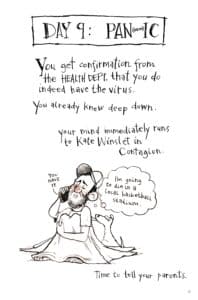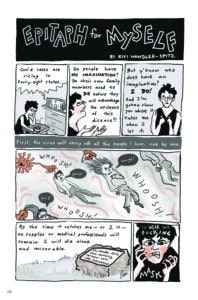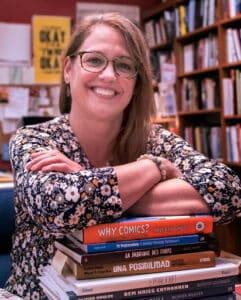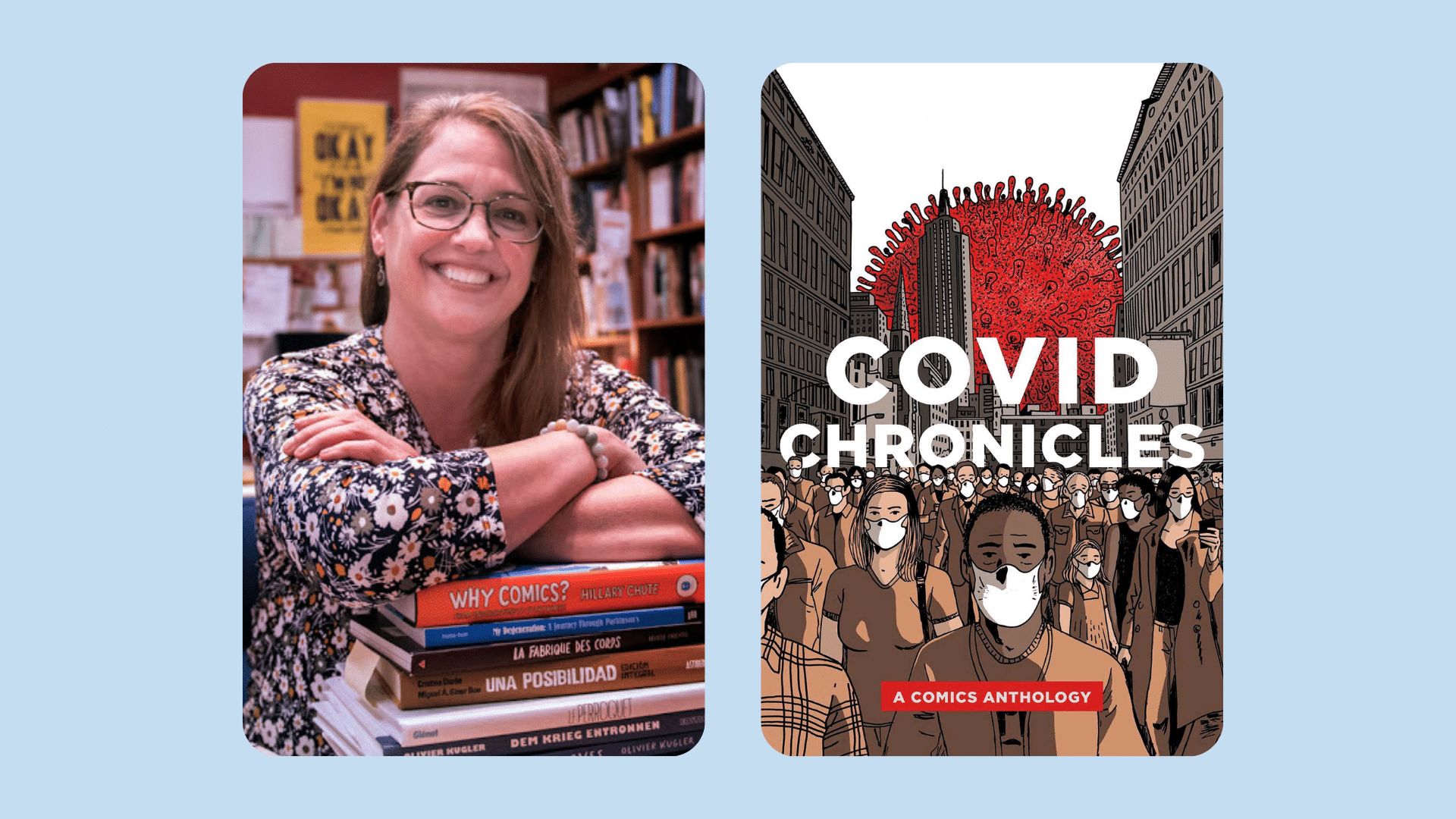These days comic books are everywhere—pop culture, television, the box office. They’ve even recently made their way into kitchens. Across the world, the medium is more popular and relevant than ever. So what better way to reflect on a massive global event than through comics. Well, that’s just what Kendra Boileau has achieved. WellWell sat down with the editor of COVID Chronicles: A Comics Anthology to chat comics and why it’s the perfect resource to express and reflect on the misery, challenges and triumphs experienced during the Covid-19 pandemic.
Why are comics a useful medium to tell these stories?
On the surface, it doesn’t seem natural because most people generally think of comics as being funny. But there’s actually been a movement in the comics world for the past 15 years called “graphic medicine”. It’s a growing group of people who promote the use of comics to tell stories about Illness, caregiving, reading, that sort of thing. Many of these stories, which can be either short comics or longer format graphic novels, offer really personal accounts of grappling with some sort of illness, disability or hardship. It stems from the belief that the medium of comics, in its hybrid format with words and images, is a great way to break down complex ideas for people by expressing emotionally charged ideas that maybe are harder to express with just words alone.
That being said, many of the pieces in this anthology are still quite humorous. What is the benefit of bringing some levity to a situation as depressing and demoralizing as a global pandemic?
Some of the humor is pretty dark humor so I guess I wouldn’t call that levity. In other cases, it’s just what we needed. In June when things were looking really grim, I began talking to the authors about this anthology and many ended up adding similar caveats that in the same panel where they say it’s no laughing matter, hundreds of thousands dead, economic devastation, we’re all suffering, they’d add some humor. Because if people get even a little joy, making and sharing artwork then it’s worth something.
What was that development process like in making COVID Chronicles, where did the idea come from and how did you select the comics to use?
In March, we were gearing up to launch a new graphic novel imprint called Graphic Mundi and because we had a history of publishing other comics dealing with pretty serious health topics under graphic medicine, we thought wouldn’t it be nice to launch the imprint with a book about Covid since this is such a huge moment. I put out a call the following month and made clear that this was a charity project so I was asking creators to donate their work, which they did on a non-exclusive basis. I didn’t collect any payment as the volume editor and we’re donating a portion of the proceeds to BINC, the Book Industry Charitable Foundation.
What was the reaction from creators?
Massive. I thought we’d put together maybe 100 pages of a few comics but the whole thing escalated so quickly. The response on social media exploded and I was getting tons of submissions, way more than I expected. For six months I received daily submissions, from April to October. And every step of the way, we were seeing new perspectives and revelations realized in these strips. As the scale of the pandemic grew and this tiny virus began revealing inequalities at the economic level and the political level, which was followed by backlash to all of that, it became an even bigger story.
Given how pivotal social media was in producing the book, what role did social media play during the pandemic and could this all be viewed as an extension of the support it provided?
I think so. All of us were in lockdown in some form. It was a lonely time for a lot of people and I think social media helped give a sense of community. These comics offered a window into other people’s experiences that seemed all the more important since we were all in our own houses looking out our windows. So getting glimpses of other people’s experiences through their windows helped create a sense of community in spite of isolation and hopefully helped keep some level of connection in play.
The anthology displays a vast representation of different artistic styles, writing styles and cultural perspectives, not just through various American cultures but international cultures. What is the benefit of viewing something that is obviously a global issue from all these different perspectives?
I think it’s an important reminder, especially for the next time something like this happens to us. As we’ve seen with the pandemic, ways of managing or not managing have been so varied throughout the world. The global extent of all of this has been not only been fascinating but I think it’s a wakeup call, or at least I would hope so.
Do you feel optimistic that this experience helped us all come together as a united world?
I wish I did but I don’t. I’ve seen, by way of comics, grassroots efforts to come together, push back and resist but as this collection shows, there are comics about the early stage of the pandemic, figuring out how to quarantine, and then ones about how the pandemic infected on. There are comics in here that show the anti-vaxers and anti-maskers who were not on the same page with people who wanted to shut things down so I don’t think we’re any closer, sadly, to being in a place where we could handle this better. But I think maybe it’s revealed a lot of stuff that we hopefully will think about and look to improve.
Many of these unique challenges and almost comic book-esque villains that we faced during the pandemic were beyond the virus itself. A lot were already prevalent, and the pandemic just escalated them, such as economic inequality, social injustice, inadequate healthcare, racism and xenophobia. How did the virus amplify the impact of all these awful things and how did they halt our ability to fight the disease as one?
It certainly shined a light on the various society inequalities and the rifts, the disunity was upsetting. I think many of us were surprised by the fact that we found ourselves on so many different pages the pandemic only exacerbated that.
From a social standpoint, what is the importance of documenting in real time the various challenges of a world altering event such as the coronavirus pandemic like you have done so with COVID Chronicles?
There certainly are a lot of graphic memoirs out there, especially when it comes to questions with health and disabilities and a lot of people are doing these graphic memoirs, which are absolutely riveting. But I think there’s something to be said for documenting in real time what’s happening when so much is at stake well because it speaks a little better to the authenticity of the moment. Even helps the stories that are created after the fact with the benefit of hindsight. One of the things I put in my call for this volume was let’s put something together that we can put on our shelves and hand down through generations. Something that will be a lasting document of the moment and that’s kind of what I’m hoping will happen with this book and others like it.
 About Kendra Boileau
About Kendra Boileau
Kendra Boileau is the Publisher of Graphic Mundi and the Assistant Director and Editor-in-Chief of Penn State University Press. She developed the Graphic Medicine line of graphic novels for PSU Press and went on to launch the Graphic Mundi imprint in 2021. Boileau has been a judge for the annual Lynd Ward Prize for the Best Graphic Novel, and she serves on the Lynd Ward Prize Advisory Board. Boileau is also a French-to-English translator of graphic novels.
Learn More At www.graphicmundi.org











